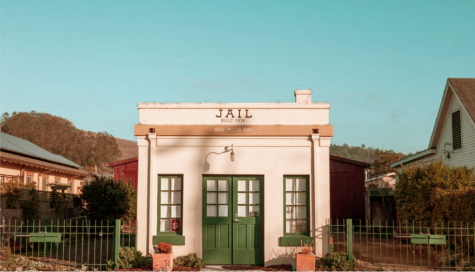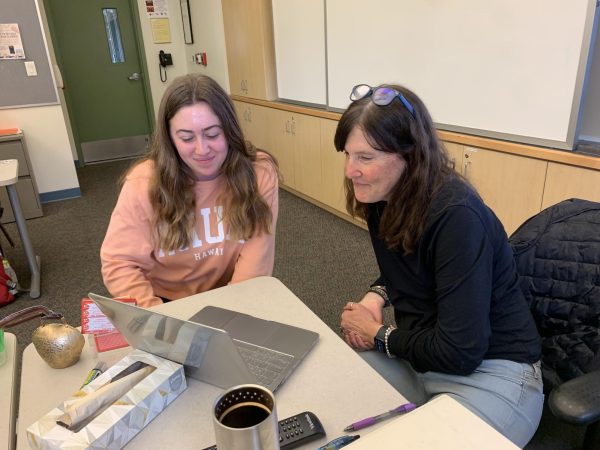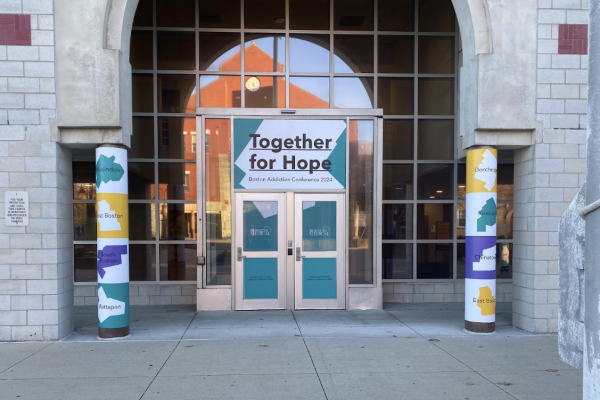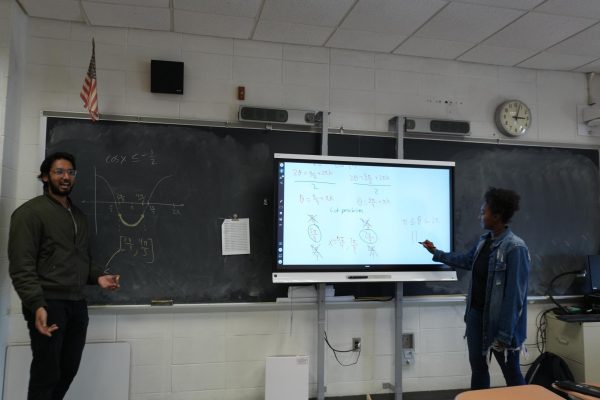Breaking out of the prison cycle
A sign stands in front of the road that leads to the entrance of San Quentin State Prison in San Quentin, California.
February 8, 2023
During a routine sweep by San Francisco’s gang task force, which was created to handle gang-related crimes, Antonio Napoleon was arrested and charged with possession of marijuana at 18 years old.
That was the first of many arrests, resulting mainly from Napoleon’s upbringing.
“I was taught that left was right, and the right way to do things was left,” Napoleon said.
Napoleon was practically born into the Norteño gang and officially joined at 14 years old.
“All the males in my family are connected to the Norteño Street Gang,” Napoleon said.
According to the Texas Department of Criminal Justice, children of incarcerated parents are five times more likely than their peers to commit crimes. Napoleon was a victim of this statistic.
“Most of the males in my family are currently incarcerated or spent most of their lives in incarceration. They’re all good people, but we’re a product of our environment,” Napoleon said.

Following his first prison sentence, Napoleon weaved in and out of jail in what seemed to be a continuous cycle. He went to treatment multiple times and even went to a halfway house. Nothing seemed to be working.
The problem was that he lacked the motivation to change. He was used to hustling and doing what he learned in the streets to survive, so getting a job and quitting other bad habits were hard.
“When it comes to doing things that we consider normal like getting a job or going to school, people who learned the street life quit. They quit because they’re not used to barriers and thinking about the certain struggles that go on with normal life,” Napoleon said.
Napoleon found the motivation to change through his family and, more importantly, his children. He wanted to improve himself so his children would not have to go through the same struggles that he did.
“My children were a big part of my inspiration and changing,” Napoleon said.
Napoleon joined multiple second chance programs, including the San Francisco Reentry Council, and he had much more success improving when he fully applied himself.
“Never give up on yourself. It may be rough at first, but the road’s not rocky forever. Take a step forward every day, and you are capable of doing anything,” Napoleon said.
Never give up on yourself. It may be rough at first, but the road’s not rocky forever. Take a step forward every day, and you are capable of doing anything.
— Antonio Napoleon
It was difficult, but Napoleon pushed through his struggles with the help of his support system, made up of family and friends. He attributes a big part of his success in rehabilitation to this system.
“I’m here because there were people who loved me when I didn’t love myself,” Napoleon said.
Napoleon has persevered through a lot to get to where he is now and offered advice for others trying to change.
“We kinda get into this mindset that if you’re institutionalized, you can’t do certain things or become what you really want to be in life. It’s possible if you are willing to do the work,” Napoleon said.
Life in and out of prison
According to a study by the Bureau of Justice Statistics, in 2016, 47% of state prisoners were parents of at least one minor. This statistic has far-reaching implications: almost half of the prisoners had children who would grow up without their biological parents, increasing these children’s chances of committing a crime to five times more than their peers.
They know how to do what they do in the streets, but when it comes to doing normal things that we considered normal, getting a job, going to school, they quit, they quit, because you’re not used to barriers and thinking about the certain struggles that go on with normal life.
— Antonio Napoleon
Convicted criminals have a difficult and extensive journey exiting the criminal justice system. A support system is a key to preventing former convicts from returning to jail.
“My support network is a huge part, but also surrendering my will, my pride, my ego, to find out who Antonio really is. Getting out of the criminal justice system is a very hard battle, which is why the support system is so crucial in somebody changing,” Napoleon said.
Recidivism is the tendency of a convicted criminal to re-offend. According to the Prison Policy Initiative, “At least 1 in 4 people who go to jail will be arrested again within the same year – often those dealing with poverty, mental illness, and substance use disorders, whose problems only worsen with incarceration.”
“What started as low-level offenses snowballed over the years, and it turned into a way of life for them,” said Adriane Lee, a probation officer.
After prison, a large majority go to halfway houses, places for people with criminal backgrounds or substance abuse problems to learn or relearn the necessary skills to reintegrate into society and better support and care for themselves. Once released from the halfway houses, people go two ways: either return to their old life or search for a job.
“Halfway houses don’t provide a support system. They provide accountability. The re-entry council and other second-chance organizations are where you go to get this type of help,” Napoleon said.
According to a study by the Second Chance Business Coalition, one’s criminal record reduces their chances of a second interview by 50%, so former criminals are already at a considerable disadvantage. Many jobs still don’t require background checks, but knowing that companies and people will look at one differently because of their past causes these people to become discouraged.
“You have to deal with stigmatism and the crazy looks people would give you. But that’s their issue. That’s not my issue,” said Victoria Westbrook, a justice-involved person.
Fortunately, under the Fair Chance Act, it is illegal for most employers in California with five or more employees to ask about an applicant’s criminal record before making a job offer. Employers cannot include questions about an applicant’s criminal record in their help wanted ads, applications, or during a job interview.”
For example, Dave’s Killer Bread is a company that believes in Second Chance Employment and encourages other businesses to do the same. A lack of information or understanding about employing people with criminal backgrounds can make businesses hesitant to explore this option, and Dave’s Killer Bread has a mission to change that. The company works to prevent stigmatism by “hiring the best person for the job, regardless of criminal history.”
Helping people in need
In the past few years, many organizations have been created to turn around the lives of formerly incarcerated and drug addicts. Organizations like Delancey Street Foundation and San Francisco Reentry Council have made a huge impact on the lives of many by housing and providing them with effective rehabilitation programs, but they are only effective if both sides put in the work.
These organizations rely on people to reach out to them for help to show that they are motivated and want to turn their lives around.
“I think those organizations are great for people who want to and have the motivation to better themselves and not recidivate. Those only work when the motivation is there, so it’s like a tool,” Lee said.
The San Francisco Reentry Council funds about 16 housing programs for probationers and formerly incarcerated and houses 350-400 people on any given day. These transitional housing programs are free so that people can save money, and it helps stabilize people so they can get their lives back.
Delancey Street Foundation changes the lives of many by breaking people down and building them back up. They allow the citizens in Delancey Street to help each other instead of employees because employees have trouble relating.
These organizations have changed the lives of many people. They are partially why there have been only 118 residents imprisoned per 100,000 residents in San Francisco during the 2020 U.S. Census, compared to 310 per 100,000 statewide.
Throughout the U.S., there have also been laws similar to the Fair Chance Act created to help former convicts, to help get them back on their feet and overcome obstacles in the way of getting their life back.
Collaboration
Organizations and former convicts must work together to leave the criminal justice system successfully.
“The SF Reentry Council’s goal is not just to house someone, but to help someone regain their life and successfully get out of the criminal system,” Westbrook said.
For this to work, former convicts must do their part in reaching out to organizations and commit themselves to making a change in their life.
Westbrook shared a moral of hers that allowed her to become successful.
“My past shapes me, but it doesn’t define me unless I let it,” Westbrook said.
This story was originally published on Scot Scoop News on January 30, 2023.



























![IN THE SPOTLIGHT: Junior Zalie Mann performs “I Love to Cry at Weddings,” an ensemble piece from the fall musical Sweet Charity, to prospective students during the Fine Arts Showcase on Wednesday, Nov. 8. The showcase is a compilation of performances and demonstrations from each fine arts strand offered at McCallum. This show is put on so that prospective students can see if they are interested in joining an academy or major.
Sweet Charity originally ran the weekends of Sept. 28 and Oct. 8, but made a comeback for the Fine Arts Showcase.
“[Being at the front in the spotlight] is my favorite part of the whole dance, so I was super happy to be on stage performing and smiling at the audience,” Mann said.
Mann performed in both the musical theatre performance and dance excerpt “Ethereal,” a contemporary piece choreographed by the new dance director Terrance Carson, in the showcase. With also being a dance ambassador, Mann got to talk about what MAC dance is, her experience and answer any questions the aspiring arts majors and their parents may have.
Caption by Maya Tackett.](https://bestofsno.com/wp-content/uploads/2024/02/53321803427_47cd17fe70_o-1-1200x800.jpg)
![SPREADING THE JOY: Sophomore Chim Becker poses with sophomores Cozbi Sims and Lou Davidson while manning a table at the Hispanic Heritage treat day during lunch of Sept 28. Becker is a part of the students of color alliance, who put together the activity to raise money for their club.
“It [the stand] was really fun because McCallum has a lot of latino kids,” Becker said. “And I think it was nice that I could share the stuff that I usually just have at home with people who have never tried it before.”
Becker recognizes the importance of celebrating Hispanic heritage at Mac.
“I think its important to celebrate,” Becker said. “Because our culture is awesome and super cool, and everybody should be able to learn about other cultures of the world.”
Caption by JoJo Barnard.](https://bestofsno.com/wp-content/uploads/2024/01/53221601352_4127a81c41_o-1200x675.jpg)















